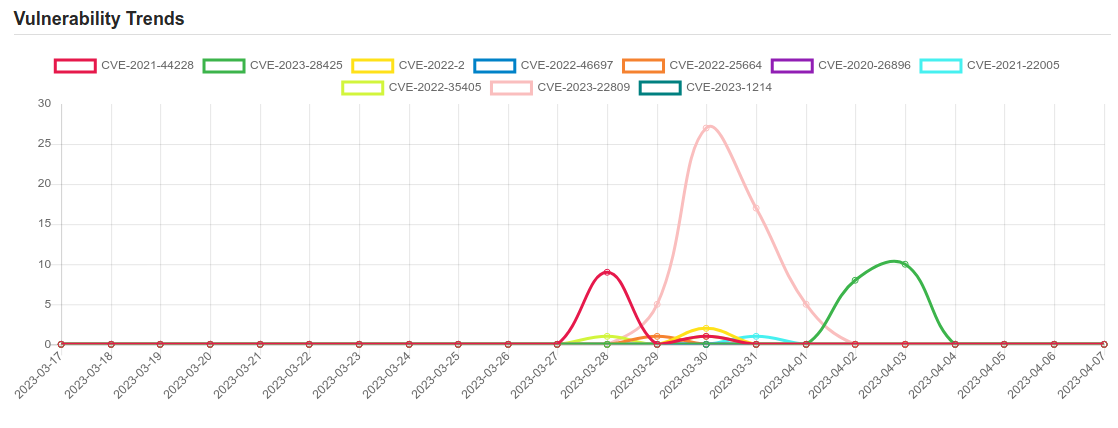Daily Vulnerability Trends: Sat Apr 08 2023

| CVE NAME | CVE Description |
| CVE-2023-28205 | No description provided |
| CVE-2021-44228 | Apache Log4j2 2.0-beta9 through 2.15.0 (excluding security releases 2.12.2, 2.12.3, and 2.3.1) JNDI features used in configuration, log messages, and parameters do not protect against attacker controlled LDAP and other JNDI related endpoints. An attacker who can control log messages or log message parameters can execute arbitrary code loaded from LDAP servers when message lookup substitution is enabled. From log4j 2.15.0, this behavior has been disabled by default. From version 2.16.0 (along with 2.12.2, 2.12.3, and 2.3.1), this functionality has been completely removed. Note that this vulnerability is specific to log4j-core and does not affect log4net, log4cxx, or other Apache Logging Services projects. |
| CVE-2022-27598 | A vulnerability have been reported to affect multiple QNAP operating systems. If exploited, the vulnerability allow remote authenticated users to get secret values. The vulnerabilities affect the following QNAP operating systems: QTS, QuTS hero, QuTScloud, QVP (QVR Pro appliances) We have already fixed the vulnerabilities in the following operating system versions: QTS 5.0.1.2346 build 20230322 and later QuTS hero h5.0.1.2348 build 20230324 and later |
| CVE-2023-28425 | Redis is an in-memory database that persists on disk. Starting in version 7.0.8 and prior to version 7.0.10, authenticated users can use the MSETNX command to trigger a runtime assertion and termination of the Redis server process. The problem is fixed in Redis version 7.0.10. |
| CVE-2023-1947 | A vulnerability was found in taoCMS 3.0.2. It has been classified as critical. Affected is an unknown function of the file /admin/admin.php. The manipulation leads to code injection. It is possible to launch the attack remotely. The exploit has been disclosed to the public and may be used. VDB-225330 is the identifier assigned to this vulnerability. |
| CVE-2022-2 | No description provided |
| CVE-2022-46697 | An out-of-bounds access issue was addressed with improved bounds checking. This issue is fixed in macOS Ventura 13.1. An app may be able to execute arbitrary code with kernel privileges. |
| CVE-2022-27597 | A vulnerability have been reported to affect multiple QNAP operating systems. If exploited, the vulnerability allow remote authenticated users to get secret values. The vulnerabilities affect the following QNAP operating systems: QTS, QuTS hero, QuTScloud, QVP (QVR Pro appliances) We have already fixed the vulnerabilities in the following operating system versions: QTS 5.0.1.2346 build 20230322 and later QuTS hero h5.0.1.2348 build 20230324 and later |
| CVE-2022-25664 | Information disclosure due to exposure of information while GPU reads the data in Snapdragon Auto, Snapdragon Compute, Snapdragon Connectivity, Snapdragon Consumer IOT, Snapdragon Industrial IOT, Snapdragon Mobile, Snapdragon Wearables |
| CVE-2023-1707 | No description provided |
| CVE-2023-1946 | A vulnerability was found in SourceCodester Survey Application System 1.0 and classified as problematic. This issue affects some unknown processing of the component Add New Handler. The manipulation of the argument Title with the input leads to cross site scripting. The attack may be initiated remotely. The exploit has been disclosed to the public and may be used. The identifier VDB-225329 was assigned to this vulnerability. |
| CVE-2023-1801 | The SMB protocol decoder in tcpdump version 4.99.3 can perform an out-of-bounds write when decoding a crafted network packet. |
| CVE-2023-23218 | No description provided |
| CVE-2020-26896 | Prior to 0.11.0-beta, LND (Lightning Network Daemon) had a vulnerability in its invoice database. While claiming on-chain a received HTLC output, it didn’t verify that the corresponding outgoing off-chain HTLC was already settled before releasing the preimage. In the case of a hash-and-amount collision with an invoice, the preimage for an expected payment was instead released. A malicious peer could have deliberately intercepted an HTLC intended for the victim node, probed the preimage through a colluding relayed HTLC, and stolen the intercepted HTLC. The impact is a loss of funds in certain situations, and a weakening of the victim’s receiver privacy. |
| CVE-2021-22005 | The vCenter Server contains an arbitrary file upload vulnerability in the Analytics service. A malicious actor with network access to port 443 on vCenter Server may exploit this issue to execute code on vCenter Server by uploading a specially crafted file. |
A considerable amount of time and effort goes into maintaining this website, creating backend automation and creating new features and content for you to make actionable intelligence decisions. Everyone that supports the site helps enable new functionality.
If you like the site, please support us on “Patreon” or “Buy Me A Coffee” using the buttons below


To keep up to date follow us on the below channels.





![Cobalt Strike Beacon Detected - 8[.]219[.]161[.]236:48899 8 Cobalt-Strike](https://www.redpacketsecurity.com/wp-content/uploads/2021/11/Cobalt-Strike-300x201.jpg)
